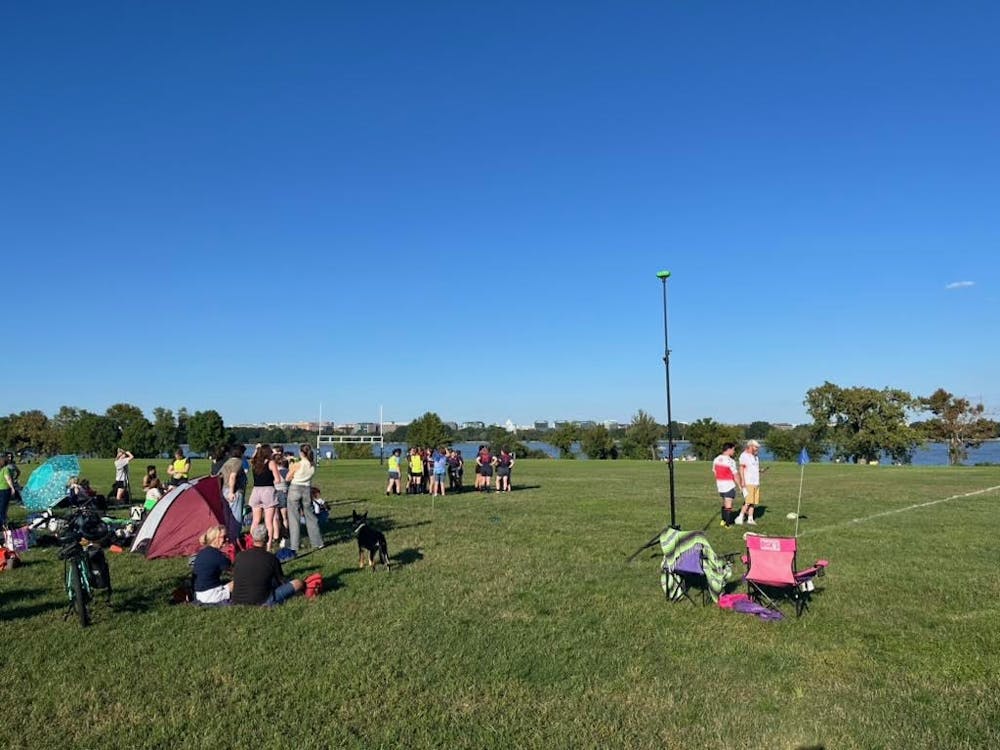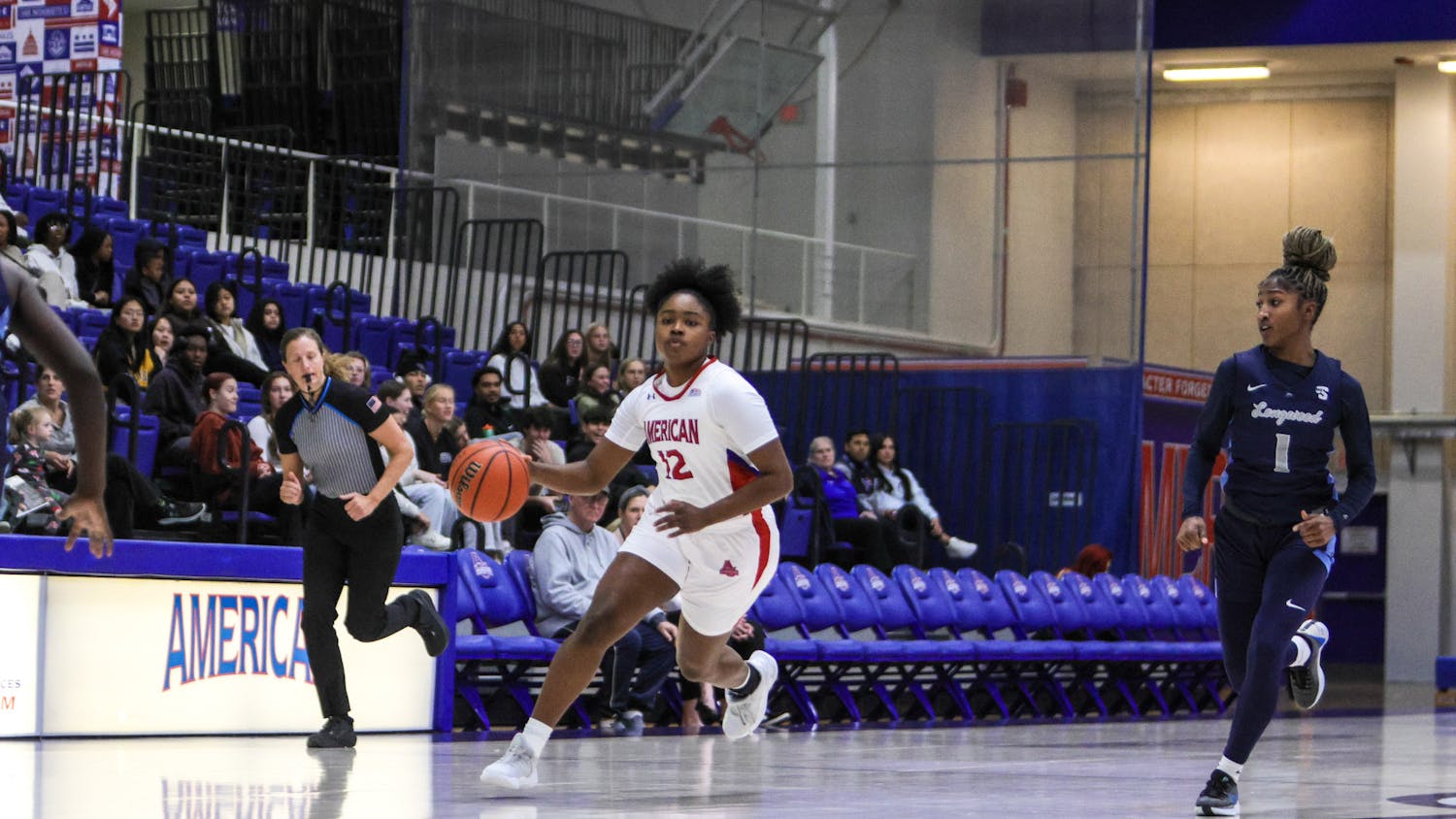For most people, graduating high school indicates it’s time to “hang ‘em up,” as the obligation to play a sport and the access to do so simultaneously fade. The barrier of entry for adult sports tends to alienate newcomers and favor lifelong players, effectively putting athletic experimentation out of reach beyond the teenage years.
American University’s club sports are unusually hospitable for the layperson to broaden their athletic horizons. The school’s relatively small student body has access to 27 club sports, and the University’s rugby team represents the prime conditions for athletes of all backgrounds to flourish. Experience is optional; rugby is the epitome of “easy to learn, hard to master” — athleticism alone, without knowledge of the sport, is enough for entry-level rugby.
And thus women’s rugby rookie Nina Swayne, a sociology major in the College of Arts and Sciences, is the poster child for American University club sports.
Just weeks ago Swayne was searching for an athletic outlet.
“I really wanted to do boxing or something physical and aggressive,” she said. “AU does not have [boxing], and I was not about to pay for a gym membership or something like that.” The hesitation to pay for a gym membership, solely for boxing, is understandable as Swayne is a college sophomore living on-campus with access to the University’s gyms.
With boxing out of reach, Swayne stumbled across rugby and decided to give it a shot. She already knew fellow sophomores Myla Pirmann and Ruby Burg Naughton on the team, softening the intimidation of joining a foreign full-contact sport. Even then, taking up a sport where health is a luxury, not a privilege, with no prior exposure to it, would be a rash and foolish decision for anyone else. Not Swayne, though.
Right away, Swayne became indispensable. She is already a full-time player — in some games, including the team’s most recent scrimmage against Nova Women’s Rugby, Swayne remains on the field for the full 80 minutes.
Much of her value on the field comes from the utility of her abilities. Swayne is athletic and smart with the ball, so she can fill in seamlessly for any of the back seven while even subbing in when the forwards need a jolt of athleticism. Backs are notoriously averse to switching to the less glamorous and more thankless forward positions, but Swayne had no problem doing so — she even said it was rewarding.
“[Nina’s] grit and determination help energize our team and encourage each other on and off the pitch,” said junior Sari Oppenheimer, the team’s match secretary.
Team captain Liv Lufkin concurred. “From the beginning it was clear that Nina was athletic and had experience playing other sports, which set her up for success on the team,” Lufkin said. “Athleticism is a great baseline to have but she also has been a very coachable player, meaning she adjusts her play based on critique and advice.”
Even with ringing endorsements from upperclassmen in leadership roles, Swayne knows she has a lot left to learn — form tackling, specifically, is still a work in progress for her.
“I think as I learn how to tackle, when I don’t do it well and they get past me, that’s the worst feeling,” she said. “When it’s moving so fast in the game it’s hard to get there, and I just hate it when I’m not able to [complete a tackle].” Laying out for a tackle is one of the toughest aspects of rugby, but Swayne watches her own film as well as film from both women’s and men’s professional games, in effort to master the art of the tackle.
Maddie Roberts, the team’s other captain, saw the vision with Nina right when the team began practicing with full contact.
“[The] first tackling practice was scary for all rookies,” she said. “Nina stood out because she asked questions, wanted to learn the correct form of tackling and [was] very receptive of feedback. She continues to strive and improve every practice.”
Such commitment to improving her tackling underscores the coachability Lufkin sees in Swayne.
“Understanding what you need to change as an athlete and then actually being able to implement it immediately makes you an incredibly dynamic player and one with the potential ability to play many different positions and roles on the field,” Lufkin said of Swayne.
The early returns on Swayne’s rugby career are especially impressive considering she hasn’t played organized sports since middle school. Swayne played basketball and soccer, alongside running cross country in middle school, but the culture around sports at her private high school outside of Baltimore was a deal-breaker for her.
“My high school was a really intense sports school,” she said. “ It was really elitist.”
In contrast, Swayne cites the culture of AU women’s rugby as the driving force in her decision to stick with the sport.
“I love the team… everybody is really hilarious,” she said. “There’s just a really great team dynamic.”
Each week the team gathers for a potluck dinner, and this week it’s the rookies’ turn to provide the food. One problem, though: most of the rookies live in kitchenless dorms.
“I live in Constitution [Hall] so I don’t have a kitchen,” Swayne says. “I don’t know, I’ll figure it out. Maybe pasta or something.”
This article was edited by Penelope Jennings, Delaney Hoke and Abigail Turner. Copy editing done by Luna Jinks, Emma Brown, Sabine Kanter-Huchting and Nicole Kariuki.





